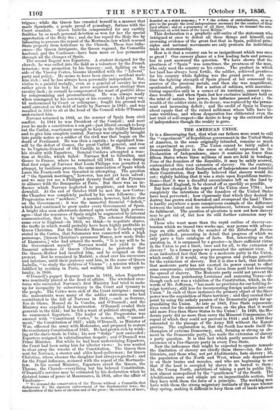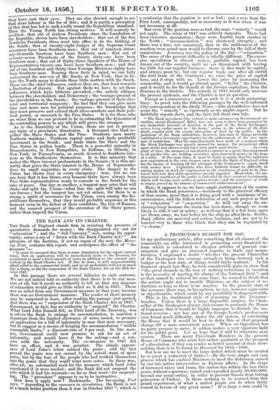THE AMERICAN UNION.
IT is a discouraging fact, that what our fathers were wont to call the "experiment" of Republican government in the United States of America, in the sense originally intended, remains as much an experiment as ever. The Union cannot be fairly called a Democratic Republic in the sense so clearly expressed in the Declaration of Independence, since it contains no fewer than fifteen States where three millions of men are held in bondage. None of the founders of the Republic, it may be safely averred, contemplated this vast extension of slavery. On the contrary, when they uttered their Declaration of Independence and founded their Constitution they fondly believed that slavery, would die out; rightly holding that it was a stain upon Republican institn- tions—that it was a dreadful encumbrance left on the land by Monarchical England, to be cleared off as speedily as possible.
But how changed is the aspect of the Union since 1'784 ; how
completely the intentions of the founders of the United States have been perverted ; how vigorously that which they desired to destroy has grown and flourished and overspread the land ! There is hardly anywhere a more conspicuous example of the difference between the intent and its accomplishment, between design and
its fulfilment. The question of questions is now not how slavery may be got rid of but how its still further extension may be checked.
Those who want more than the rapid outline of slavery-ex- tension which we traced two weeks ago, may peruse with advan- tage an able article in the number of the Edinburgh Review just published, presenting in detail that progress of which we only gave a bare catalogue of facts. But, interesting as that question is, it is surpassed by a greater—is there sufficient virtue in the Union to put a limit, once and for all, to the extension of slavery ? In a former paper we presented the optimist view. It is an undoubted fact that there is a moderate party in the Union, which could, if it would, stop the progress and perhaps provide for the extinction of slavery. But it is also a fact, that hitherto that moderate party has not exerted its power except to effect some compromise, extricating the Union from peril but favouring
the spread of slayery, The Moderate could not prevent the Democrats from purchasing Louisiana and annexing Texas—al- though each act was a violation of the Constitution, which, in the words of Mr. Jefferson, "has made no provision for our holding fo- reign territory, still less for incorporating foreign nations into our Union." In each of these instances the primary object of the Slave power was the acquisition of Slave territory ; and they carried their point by using the unholy passion of the Democratic party for ag- grandizing the Union. As late as 1845, Free State representa- tives voted for the admission of Texas, on the plea that it would add more Free than Slave States to the Union ! In 1820, the Mo- derate party did no more than carry the Missouri Compromise, the repeal of which they could not prevent in 1854; and in 1856 they consented to the passage of the Army Bill without the Kansas proviso. The explanation is, that the South has made itself the champion of extreme Democracy, and, forming so strong an ele- ment in the Democratic party, has made the extension of slavery a party question. It is this fact which partly accounts for the existence of a Pro-Slavery party in every Free State. Now the influences that might be expected to operate towards the limitation of slavery are chiefly these three—lst, the Abo- litionists, and those who, not yet Abolitionists, hate slavery ; 2d, the population of the North and West, whose sole dependence is on their brains and muscles, and who are beginning to see that if the land is occupied by slaves it is barred to them ; 3d, the Young North, ambitious of taking a part in public life, now almost monopolized by the " gentlemen " of the South. The Abolitionists pure and simple are an impracticable section, but they have with them the force of a principle. The working men have with them the strong migratory instincts of the race whence they spring, making it difficult to keep them out of lands whereon
they have east their eyes. They are also shrewd enough to see that slave labour is the foe of free ; and it is partly a perception of this that has led to such a rally round the Republican standard. Then the Young North has strong motives. It will scarcely be credited, that out of sixteen Presidents since the foundation of the Republic eleven have been slaveholders ; that out of the five Northern Presidents three went into office to do the bidding of the South; that of twenty-eight Judges of the Supreme Court seventeen have been Southern men ; that out of nineteen Attor- ney-Generals fourteen have been Southern men ; that out of seventy-seven Presidents of the Senate sixty-one have been Southern men ; that out of thirty-three Speakers of the House of Representatives twenty-one have been Southern men ; and that out of one hundred and thirty-four Foreign Ministers eighty have been Southern men. Bearing these facts in mind, we can fully understand the war-cry of Mr. Banks at New York, that in fu- ture the North mean to divide these little matters with the South. These are the chief influences, such as they are, that tend towards a limitation of slavery. But against them we have to set those influences which have hitherto prevailed,—the unholy alliance between the slaveholders and Democracy ; the vantage-ground of the slaveholders in the Senate; the vantage-ground of their elec- toral and territorial conquests ; the fact that they can give more time and more men for political purposes ; the knowledge that they must preserve and extend their slave-markets and their poli- tical power, or succumb to the Free States. It is for those who are wiser than we can pretend to be in estimating the dynamics of the contending powers to say which will prove the stronger. As to the durability of the Union, there are not at present any signs of a proximate dissolution. A thousand ties bind to- gether the Slave States and the Free. Southern men marry Northern maidens ; Northern capital seeks and finds profitable investment in the South ; and trade binds the Slave and the Free States in golden bonds. There is a powerful minority in Massachusetts, in New Hampshire, in Indiana, in Illinois, in New York, in Pennsylvania, as much devoted to Southern inte- rests as the Southerners themselves. It is this minority that makes the Slave interest predominate in the Senate ; it is this mi- nority that gives the Slave interest in the House of Representa- tives its small majorities in every crisis. The danger to the Union has blown over in every emergency : true, but no one can deny that it has blown over 'bemuse there have always been Free State representatives ready to 'concede to the Smith for the sake of peace. One day or another, a tempest may arise that will shake and split the Union—what line the split will take -no one can foresee ; but the tempest has not yet arisen, for there is so strong a spirit of reverence for the Union even among the Re- publicans themselves' that they would protably acquiesce at this moment even in the defeat of their candidate, the loss of Kansas, and the assured prospect of the extension of the Slave power, rather than imperil the Union.



























 Previous page
Previous page